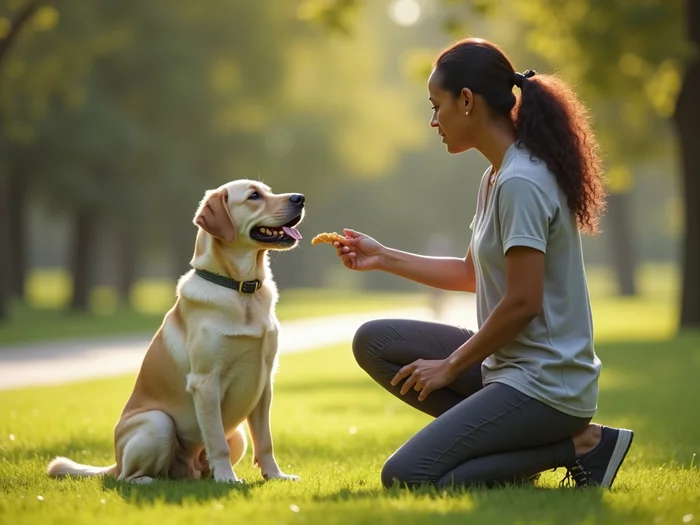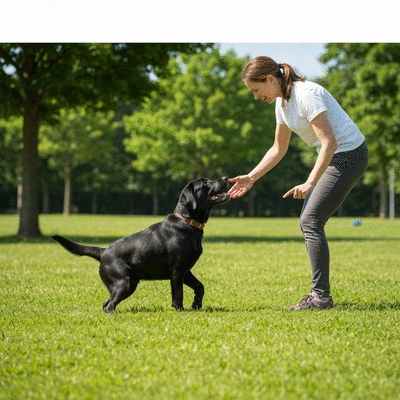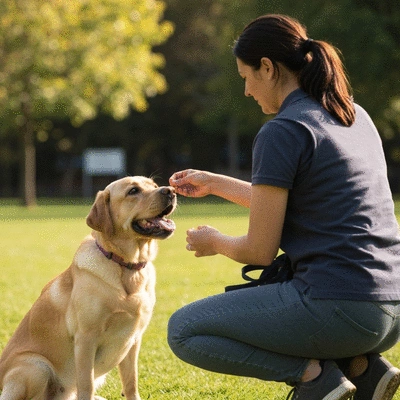Labrador Training Challenges: Troubleshooting Tips

Posted on: 2025-10-18
By: Clara Hastings
What if you could transform your Labrador from a distracted puppy into a well-behaved companion? The journey begins with understanding their unique traits and training challenges. Here's what you'll discover about effective Labrador training!
What You Will Learn
- Labradors are friendly and energetic, requiring early and consistent training to manage their curiosity and impulsiveness.
- Understanding a Labrador's vibrant personality can help in developing strategies to channel their energy positively during training.
- Common behaviors such as excessive chewing and jumping stem from their instincts; addressing these requires tailored training techniques.
- Utilizing positive reinforcement and establishing a routine are key strategies to keep Labradors engaged and motivated during training sessions.
- Connecting with professional trainers and resources can provide additional support to enhance your Labrador's training journey.
- Participation in dog training classes helps improve obedience while also offering valuable socialization opportunities for your Labrador.
Labrador Training Challenges & Solutions
Labradors, with their unique traits, often present specific training hurdles. This visual highlights common issues and effective strategies to foster a well-behaved companion.
Behavioral Traits Leading to Challenges
- • Energetic: Leads to distractions & impulsiveness.
- • Social: Seeks interaction, diverting focus.
- • Curious: Can lead to unwanted chewing/digging.
Common Behavior Issues
- • Excessive Chewing: Often due to boredom/anxiety.
- • Jumping Up: Excitement, seeking attention.
- • Poor Recall: Distraction or inconsistent training.
- • Overexcitement: High energy can lead to impulsiveness.
Effective Training Techniques
- • Positive Reinforcement: Reward desired behaviors.
- • Daily Routine: Establish consistent training sessions.
- • Interactive Toys: Keep your Lab engaged.
- • Early Socialization: Develop well-rounded dogs.
Resources for Continued Learning
- • Professional Trainers: Specializing in positive reinforcement.
- • Online Courses: Tailored for Labrador owners.
- • Local Training Groups: For socialization & practice.
Tackling Training Challenges Unique to Labradors
As a passionate Labrador enthusiast, I understand that training our furry friends can sometimes feel like an uphill battle! Labradors have unique behavioral traits that can present specific challenges during training. Let's dive into what makes these lovable dogs tick and how we can overcome those hurdles together!
Understanding Labrador Behavioral Traits
Labradors are known for their friendly and social nature. However, this also means they can be quite energetic and easily distracted. Their desire to interact with people and other dogs can influence their training processes. For instance, did you know that Labradors love to explore their surroundings? This curiosity can lead to impulsiveness, making it essential to start training early and consistently. Research highlights the importance of understanding breed-specific traits, such as those of Labradors, to develop effective training strategies. For more information, you can explore studies on canine behavior and training like the one found at PMC NCBI.
- Affectionate: Labradors thrive on human interaction, making them eager learners.
- Energetic: Their high energy levels can lead to distractions during training sessions.
- Intelligent: Labradors are quick learners but can become bored if training isn’t engaging.
Understanding these traits will help you tailor your training methods to their unique personality, ensuring they stay focused and motivated.

Why Labrador Training Challenges Occur
Training challenges commonly arise due to a Labrador's vibrant personality. Their high energy levels often lead to impulsive behavior, making it tough to focus on commands. Additionally, their sociable nature can cause them to seek out distractions, whether it's a squirrel, another dog, or even a friendly passerby! Studies on canine cognition and behavior, such as those published on PMC NCBI, further illustrate how a dog's natural tendencies can impact their trainability.
- High energy levels can lead to overexcitement during training.
- Social tendencies may result in attention being diverted away from you.
- Curiosity can lead to unwanted behaviors, like chewing on furniture or digging.
By recognizing these challenges, you can develop strategies to help your Labrador channel their energy positively and remain engaged during training sessions.
Identifying Common Behavior Issues in Labradors
Some prevalent behavior issues specific to Labradors include excessive chewing, jumping, and difficulty with recall. These behaviors often stem from their natural instincts and high energy levels. Understanding the root cause can help you implement effective training techniques to address these challenges. Research from institutions like Lindenwood University provides valuable insights into dog behavior and how tailored training can mitigate common issues.
- Excessive Chewing: Often a sign of boredom or anxiety.
- Jumping Up: Typically a result of excitement or seeking attention.
- Poor Recall: Can be influenced by distraction or lack of training consistency.
Recognizing these issues is the first step toward fostering a well-behaved, happy Labrador. With the right training tools and techniques, you can guide your Lab toward better behavior and ensure a joyful companionship.
Common Labrador Training Issues and Expert Solutions
Now that we've explored the challenges, let’s look at some of the most common training issues Labradors face and how to tackle them with expert solutions!
Engage with Your Labrador!
How do you keep your Labrador engaged during training sessions? Share your favorite tips or techniques in the comments below!
Frequently Asked Questions About Labrador Training
What are the primary behavioral traits of Labradors that influence training?
Labradors are known for being affectionate, energetic, and intelligent. While their affection makes them eager learners, their high energy can lead to distractions, and their intelligence means training needs to be engaging to prevent boredom.
Why do Labradors often face unique training challenges?
Training challenges in Labradors often stem from their vibrant personality. Their high energy levels can cause impulsiveness, and their sociable nature can lead them to be easily distracted by people, other animals, or their environment.
What are common behavior issues seen in Labradors?
Common behavior issues include excessive chewing (often due to boredom or anxiety), jumping up (excitement or attention-seeking), and poor recall (distraction or inconsistent training).
What are the most effective training techniques for Labradors?
Effective techniques include positive reinforcement, establishing a daily training routine, using interactive toys, early socialization, and practicing recall and leash manners consistently.
How can professional trainers and training classes help with Labrador training?
Professional trainers can provide specialized guidance, especially those who focus on positive reinforcement. Dog training classes offer structured learning, improve obedience, and provide valuable socialization opportunities, boosting both the Labrador's skills and the owner's confidence.
Summarizing Effective Labrador Training Techniques
As we wrap up our exploration of Labrador training, it’s essential to recap the key strategies that will help you overcome common challenges. By applying these expert-backed solutions, you can nurture a well-behaved and happy Labrador. Remember, consistency, patience, and positive reinforcement are your best friends on this journey!
Here’s a quick summary of the most effective training techniques for Labradors:
- Utilize positive reinforcement to reward desired behaviors.
- Establish a daily routine for training sessions.
- Incorporate interactive toys to keep your Lab engaged.
- Focus on socialization from an early age to develop well-rounded dogs.
- Practice recall and leash manners to ensure safe outings.
Each of these strategies plays a vital role in shaping your Labrador’s behavior. Have you seen the difference in your dog’s behavior with these techniques? It’s truly rewarding to witness their growth and understanding!

Encouraging Continued Learning and Support
At Happy Labrador Life, we believe in the power of community. Engaging with fellow Labrador owners can provide invaluable insights and encouragement. Don’t hesitate to share your experiences or seek advice—after all, we’re in this together!
Connecting with Professional Trainers and Resources
Finding the right support is crucial for your training journey. Connecting with professional trainers and resources can really enhance your understanding. Here are some recommendations to get you started:
- Local dog trainers specializing in positive reinforcement methods.
- Online training courses tailored to Labrador owners.
- Local training groups or clubs for socialization and practice.
Utilizing these resources can help you gain new perspectives and techniques that suit your Labrador's unique needs!
Exploring Dog Training Classes for Labradors
Enrolling in a dog training class can offer structured learning and socialization opportunities for your Labrador. These classes not only improve obedience but also provide a great chance for your Lab to interact with other dogs. When looking for a class, consider:
- Classes that focus on positive reinforcement techniques.
- Trainer credentials and experience with Labradors.
- Locations that are convenient for you and your dog.
Participating in dog training classes can significantly enhance your Labrador’s skills while building your confidence as a handler. Plus, it’s a fun way to bond with your furry friend!
Recap of Key Points
Here is a quick recap of the important points discussed in the article:
- Understand Labrador behavioral traits: They are affectionate, energetic, and intelligent.
- Training challenges often stem from their high energy levels and social tendencies.
- Common behavior issues include excessive chewing, jumping, and poor recall.
- Utilize positive reinforcement and establish a daily training routine.
- Engage your Lab with interactive toys and focus on early socialization.
- Consider enrolling in dog training classes for structured learning and socialization.
 Have you ever considered how the products you choose for your Labrador impact their happiness and
Have you ever considered how the products you choose for your Labrador impact their happiness and
 Are you ready to dive into the art of storytelling with your beloved Labrador? Crafting a narrative
Are you ready to dive into the art of storytelling with your beloved Labrador? Crafting a narrative
 Are you ready to explore the great outdoors with your Labrador? Hiking is not just a fun activity; i
Are you ready to explore the great outdoors with your Labrador? Hiking is not just a fun activity; i
